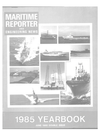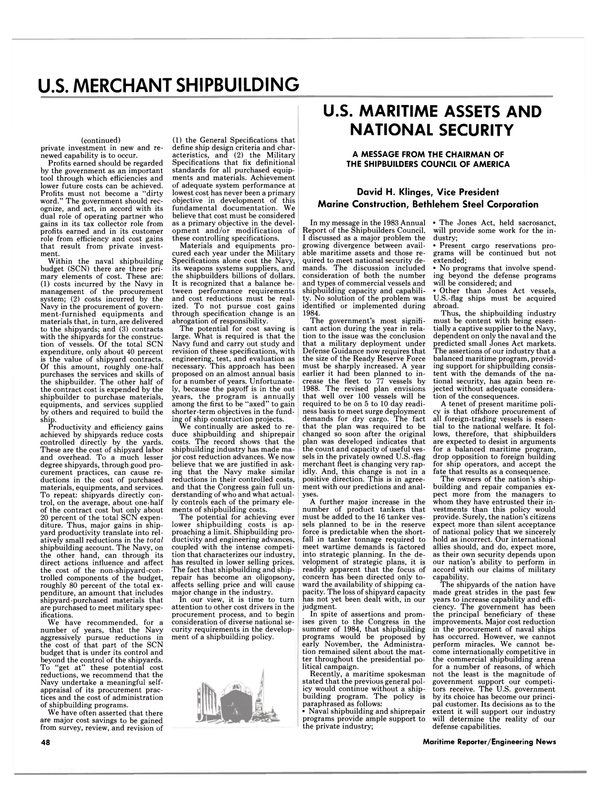
THE CIRCLE OF RELIANCE " I n Time of War, Land, Sea, and Air Forces and All Logistic Support Functions Must Work as a Team"
A conclusion stated in the 1983 Annual Report as to the prospects that commercial merchant marines will not, in the future, meet national security requirements and a statement of the maritime problem that must be solved both remain valid.
They are: "CONCLUSION—Due to dramatic shifts both in commercial markets and government policies, here and abroad, commercial markets that have previously been relied upon to provide sealift, shipbuilding, and shiprepair assets required to fulfill national security objectives can no longer be relied upon to provide these assets." " P R O B L E M S T A T E M E N T— Faced with the above conclusion, how should the nation provide (1) sealift assets in sufficient quantity and possessing operational characteristics as determined by national security demand, and (2) shipbuilding and shiprepair capability and capacity defined as essential to meet national security needs—both at lowest cost in toto?" A solution to the problem is demonstrably required.
In time of war, land, sea, and air forces and all logistic support functions must work as a team. Military commanders must be able to assess with accuracy their commands' abilities and insure that these capabilities work in concert with companion forces and support functions to achieve defined objectives.
It is assumed that both the ability to work jointly and required support capabilities exist. Unfortunately, these fundamental requirements are not tested by analyzing the ability of all interlocked components to support each other. Civilian leaders are not expert in such determinations, while military leaders are neither empowered nor expected to judge the capabilities of companion force and support functions. Indeed, beyond military capability, we assume that very substantial support elements are and will remain available from non-military sources, both government and commercial in our nation and those of our Allies.
The U.S. does not have a system that provides overall coordination of military needs with industrial capacity.
Our principal adversary does. Instead, the U.S. has a "Circle of Reliance" where each service assumes that "If I'm okay, you're okay" and that all required non-military support functions, including those of our Allies, are also okay.
Consider the maritime element of the Circle. The Army, Air Force, and Marines rely on the Navy to provide military sealift. The Navy relies on its controlled assets and on the Department of Transportation (DoT) to fulfill responsibilities under the Merchant Marine Acts to provide ships, men, and shipyards needed to meet sealift needs. The DoT relies on the White House direction—both to insure the availability of our Allies' large shipping and shipbuilding resources and to set policy under which DoT can perform its statutory duty to maintain required U.S.-controlled shipping and shipbuilding assets—and the Administration relies on the Navy, Army, Air Force, and Marines to maintain forces necessary to defend the nation. The circle goes around and around. Is the untested reliance justified?
The Administration has adopted a maritime policy that severely limits support of commercial shipping and shipbuilding. It is assumed without analysis and test that Navy and commercial support will, under existing ground rules, provide sufficient assets to meet wartime demands.
The Navy has become highly concerned that these policies will not provide the required U.S. sealift needs. However the Navy, in seeking to build its combatant fleet, logically rejects the diversion of its limited fund resources to provide national assets that heretofore have been provided without significant cost to the Navy. The Army, Air Force, and Marines assume that deployment and logistic support needs will be met, but have no means to insure that this is so.
It is assumed that the entire dry cargo sealift to support a NATO crisis will be provided from the fleets of NATO Allies. These Allies rely almost exclusively upon commercial forces to provide the ships and shipyards needed to support their sealift commitments. The shipping and shipbuilding assets of the principal NATO Allies are in rapid decline.
Specifically, the adoption of the UNCTAD Code of Conduct for Liner Conferences by most of the world's trading nations, and its rejection by the U.S., have consequences upon our NATO Allies that have never been factored into forward defense planning and the development of international defense strategies.
If the Circle of Reliance is analyzed, logic compels the conclusion that the ability of our military to effectively use force capabilities being provided may fail for want of sealift and shipyard resources only assumed to be available.
Read THE CIRCLE OF RELIANCE " I n Time of War, Land, Sea, and Air Forces and All Logistic Support Functions Must Work as a Team" in Pdf, Flash or Html5 edition of June 1985 Maritime Reporter
Other stories from June 1985 issue
Content
- McDermott Gets Contract From SOHIO To Build Offshore Drilling Platform page: 6
- Shipboard Safety Criteria Monitored By Siemens Computer page: 6
- Puroflow Gets Canadian Order For Ultraviolet Water Purification Systems page: 6
- Moss Point Marine To Build Victorian-Style Sternwheel Riverboat page: 7
- Fiberglass Passenger Vessel Built By Westport For Catalina Channel page: 8
- New Facility Opened By Lips Propellers At Todd-Seattle Shipyard page: 9
- Samson Offers Brochure On Passive Mooring Systems For Supply Vessels page: 9
- Marathon LeTourneau To Construct World's Largest Bottom Supported Mobile Offshore Drilling Unit page: 12
- GEC Rolls-Royce Gensets Selected For Shell/Esso Tern Offshore Platform page: 14
- A S S C O Elects B a u m l e r V P - M a r k e t i ng page: 15
- N e w B r o c h u r e F r om W e s t i n g h o u s e Discusses C o m b u s t i o n T r i m C o n t r ol page: 15
- Raytheon Introduces JRC Color And Digital Rasterscan Radar Unit page: 16
- Simpson Timber Restructuring Its Panel Products Division page: 16
- Ingersoll-Rand Signs Sales Agreement With Kawasaki page: 17
- Murray Grainger Resumes Business Activities As Used Equipment Dealer page: 20
- New Remote Control VHF Marine Radio Introduced By Uniden page: 20
- Mitsubishi Introduces Latest Diesel Engine At New York Seminar page: 21
- Contract For Wharf At Cow Head Oil Rig Servicing Facility Awarded page: 22
- Marathon LeTourneau Exhibits Slo-Rol® Motion Suppression Technology During 1985 OTC page: 23
- Aluminum Boats Delivers Whale Watch Excursion Boat page: 23
- I.T.C. Holland Engineers Its Third Double Rig Dry Transport On The Sibig Venture page: 25
- Hitachi Zosen Completes Two Power Generating Barges For Philippines page: 25
- FUTURE U.S. NAVY BUSINESS OPPORTUNITIES —A $230 billion # 5 Year Market— page: 26
- US SHIPBUILDING OUTLOOK Markets & Cost Saving page: 44
- Secretary Dole Promulgates CDS Repayment Rule page: 44
- U.S. MARITIME ASSETS AND NATIONAL SECURITY page: 48
- THE CIRCLE OF RELIANCE " I n Time of War, Land, Sea, and Air Forces and All Logistic Support Functions Must Work as a Team" page: 50
- THE GOVERNMENT AS PARENT TO INDUSTRY: PARTICIPATION OR BENIGN NEGLECT? page: 52
- A SUCCESSFUL MARITIME POLICY UNDER ATTACK page: 58
- Offshore Service Vessels, Tugboat And Inland Towboat Fleets page: 60
- U.S. COULD LEARN A LESSON FROM GREAT BRITAIN'S OFFSHORE OIL LEASING page: 65
- CANADIAN SHIPBUILDING — 1985 — page: 76
- Liu Elected Vice President Of American Bureau To Head R&D Division page: 79
- VTHE NEW DDG-51 CLASS GUIDED MISSILE DESTROYERS —A Report— page: 80
- Harris Gets Subcontract To Supply HF Equipment For Canadian Frigate Program page: 89
- Brochure On "Sea Float" Marine Buoys And Floats Offered By Seaward page: 89
- Multi-Purpose Freighters To Be Built By Seebeck page: 89
- Omnipure Awarded $1.3-Million Contract From Canadian Navy page: 90
- New IMA Report On Future U.S. Navy Procurement Now Available page: 90
- Dubai Drydocks Reports Profit For Second Year page: 91
- Farboil Offers Free Four-Color Folder On Wetsall® Coatings page: 91
- Devoe Offers Brochure On Marine And Corrosion Control Paints & Coatings page: 92
- New Portable Hoists Line With Failsafe Brakes Now Available From PHD page: 92
- World Transport Coordinates Wet Tow Of Western Oceanic Rig page: 93
- Marinette Marine Installs First DWB Ship Transfer System In North America page: 93
- Norcontrol Offers Brochures On Navigation/Instrumentation Line Marketed In U.S. By Nav-Control page: 94
- Nichols Brothers Builds New McNeil Island Ferry page: 97
- Rowan Offers Free Literature On Drill Rig 'Rowan Gorilla IV' page: 97
- Raytheon Introduces Newest SatCom For Fishing And Pleasure Craft page: 98
- Crawford Fitting Introduces Gap Inspection Gages For SWAGELOK Tube Fittings page: 98
- Jeffboat Delivers Deck Barge For Nugent Sand Company page: 99
- Unique Actuator Selection Slide Chart Available From Jamesbury Corp. page: 99
- CRUISE '85 SHIPS • OPERATIONS • SERVICES page: 100
- Aeroquip T-J Division Offers New Series TP Proximity Switches page: 101
- Valcor Catalog Includes Products For Marine And Naval Applications page: 102
- Apelco Introduces Loudhailer With Two-Way Intercom And Alarm Features page: 102
- Marine Management Develops Demo Programs page: 103
- Marco-Seattle Converts Two Combination Crabbers For New Fishery Roles page: 103
- Markey Supplies Tug With Two Capstans page: 104
- Southwest Marine Yard Repowering San Francisco Commuter Ferries With Detroit Diesel Allison Engines page: 104
- AMETEK Announces Computerized Inspection Management System page: 105
- "Marine Library" Literature Available From DDA page: 105
- Furuno Introduces FR-803D Digital Radar page: 105
- MariChem 85 page: 106
- LIQUID CARGO HANDLING EQUIPMENT —A Review— page: 108
- Marathon LeTourneau GranGulf™ Semi Design Offers Economic Construction & Optimum Deck Load page: 113
- First Interactive Shiphandling Simulators From Ship Analytics Being Commissioned page: 116
- Stewart & Stevenson 'Mean 16' Provides Patrol Boats With New Power And Cruising Range page: 119
- Literature Available On Navlink From Datamarine page: 119
- Elliott White Gill Names New Sales Agent For Taiwan page: 120
- Blackinton Named General Manager Of Bethlehem-Beaumont Yard page: 120
- DAMPA Continuous Ceiling Approved By U.S. Navy— page: 121
- Ingersoll-Rand Forms New Compressors Division page: 122
- Menge Named Agent For Seaward Fenders page: 122
- Lanzendorfer Will Manage Fairbanks Morse Service Facility in San Diego page: 124
- $5.3-Million Navy Program Received By Tracor page: 124
- Gensler Named Director Of Marketing And Sales For InterTrade Industries page: 124
- WABCO Offers 8-page Brochure On Logicmaster™ Marine Propulsion Control Systems page: 133
- Free 12-Page Color Brochure Availale From Falk On New Shaft Speed Reducer Line page: 133


